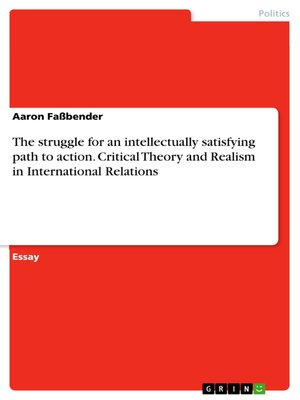The struggle for an intellectually satisfying path to action. Critical Theory and Realism in International Relations
ebook
By Aaron Faßbender

Sign up to save your library
With an OverDrive account, you can save your favorite libraries for at-a-glance information about availability. Find out more about OverDrive accounts.
Find this title in Libby, the library reading app by OverDrive.



Search for a digital library with this title
Title found at these libraries:
| Library Name | Distance |
|---|---|
| Loading... |
Essay from the year 2017 in the subject Politics - Topic: Peace and Conflict, Security, grade: -, National University of Ireland, Maynooth (Military College), course: Senior Staff Officer's Course, language: English, abstract: This essay will analyse the question whether critical theory provides a more intellectually satisfying approach to the study of international relations than realism – or if realism offers a more useful guide for political action. One could also ask: is there still a need for realism today? In order to establish a basis for further examination, this essay will sketch out realist thought and critical theory in international relations. This will be followed by a case study, which will reflect the suitability of both approaches in the Ukraine crisis. This essay does not attempt to offer an extensive analysis of the conflict but will discuss how realist and critical prisms shape the perception of this conflict. Finally, it will question if the theories offer practical guidance for political action. Realism and liberalism are the classic theories in the studies of international relations. In the last decades, these traditional ideas have been challenged by new ideas such as social constructivism, post-positivism and a variety of marxist theories. One of the neo-marxist approaches to international relations is critical theory. In his well-received article "Social forces, states, and world orders" Robert W. Cox used the distinction between critical theory and "problem solving theory" to distinguish critical theory from traditional approaches to the study of international relation. At first sight, this seems to implicate that critical theory is not interested in problem-solving.







